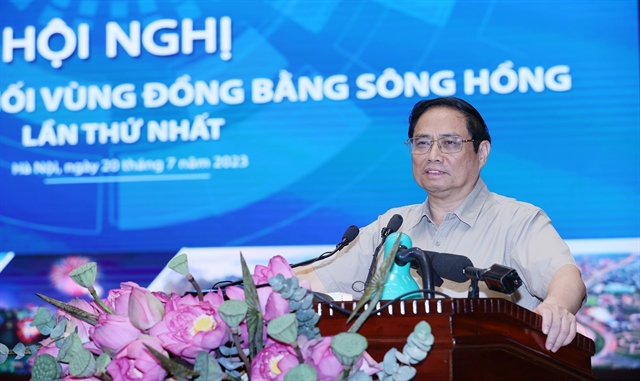 Society
Society


|
| Prime Minister Phạm Minh Chính at the first meeting of the coordinating council for Red River Delta region in Hà Nội yesterday. — VNA/VNS Photo Dương Giang |
HÀ NỘI — Regional development links are crucial in fostering connectivity, cohesion and enhancing growth among localities.
Prime Minister Phạm Minh Chính, chairman of the coordinating council for the Red River Delta (RRD) region, made the statement yesterday whilst chairing the inaugural conference of the council and initiating its proceedings.
At this gathering, the Prime Minister detailed explicit assignments to strengthen the links within the RRD region, encourage self-sufficiency and independence among localities, and add value to both regional and national development.
He said the RRD region plays a significant role in various fields, including politics, economy, culture, society, environment, national defence, security, and sovereignty over the sea and islands. It serves as the northern gateway of the country and ASEAN in terms of connecting and developing economic and trade relations with China. The RRD also acts as an important bridge in facilitating economic and cultural exchanges on the international stage.
However, the socio-economic development of the region has not yet matched its potential, advantages, and strategic position. The development of localities within the region is uneven, and they heavily rely on capital and labour.
Modern technology-based industries make up a low proportion of sectors in the region, while the structure of the state budget in some localities is not sustainable.
The infrastructure has not met demand, with inadequate transportation connections and weak tourism infrastructure.
The cooperation and linkage between localities in the region is not strong and effective.
There is a lack of clusters in various industries and concentrated agricultural production areas, the PM emphasised.
According to the government leader, in the current context, regional linkage should focus on achieving the goal of stabilising the macroeconomic situation, controlling inflation, promoting growth, and ensuring significant economic balances. Among these, priority is given to promoting growth, specifically by concentrating on three driving forces, including investment, consumption, and exports.
In addition, there will be the continued implementation of three strategic breakthroughs.
Among them, strategic infrastructure connectivity within the region will be carried out, such as constructing highways and coastal roads from Thanh Hóa, Ninh Bình, Thái Bình, Hải Phòng, Quảng Ninh; connecting technical infrastructure like electricity, water, and telecommunications; establishing connections to ensure a high-quality workforce that meets development demand; promoting administrative reform and improving the investment and business environment; and enhancing institutional frameworks, including the development of special incentive policies to foster regional development.
The regional coordinating council also facilitates linkages to effectively utilise State financial resources and leverage the financial potential of localities. It promotes public-private cooperation and partnerships to attract foreign direct investment.
The council focuses on developing social and cultural infrastructure linked to tourism. It also fosters cooperation and knowledge-sharing in administrative reform and creating a favourable investment environment.
The Prime Minister requested the provinces and cities promptly complete the establishment and deployment of activities of the council and its subordinate organisations; urgently complete provincial and regional planning, especially Hà Nội; formulate specific mechanisms and policies for the region and the Capital Law; complete the procedures and prepare for investment in coastal roads and highways in the region; study bond issuance and seek capital and ODA sources to develop high-speed railway connecting Hà Nội–Láng-Hòa Lạc and Hà Nội-Hà Nam, Vĩnh Phúc, Hưng Yên.
In addition, the council will conduct research and develop projects related to environmental protection, climate change mitigation, and promote green growth in both Hà Nội and the entire region. It will also foster linkages between industrial and commercial zones to create collective strength and avoid resource wastage.
Connecting businesses will be encouraged to boost production, trade, and revive production chains, supply, expand markets, and develop One Commune-One Product.
Furthermore, the council will focus on advancing science, technology, and innovation, and establishing mechanisms for cooperation and sharing experiences in building the Party, the political system, and combating corruption.
The Prime Minister also requested the organisation of scientific workshops focusing on digital transformation, green transformation, circular economy, sharing economy, disaster response, and climate change adaptation, especially studying the establishment of a regional infrastructure development fund.
He said that the council will review the implementation of the tasks set at the first meeting at the beginning of the fourth quarter and conduct a comprehensive evaluation of the implementation of the Politburo's resolutions on the development of socio-economic regions by the end of this year. — VNS




